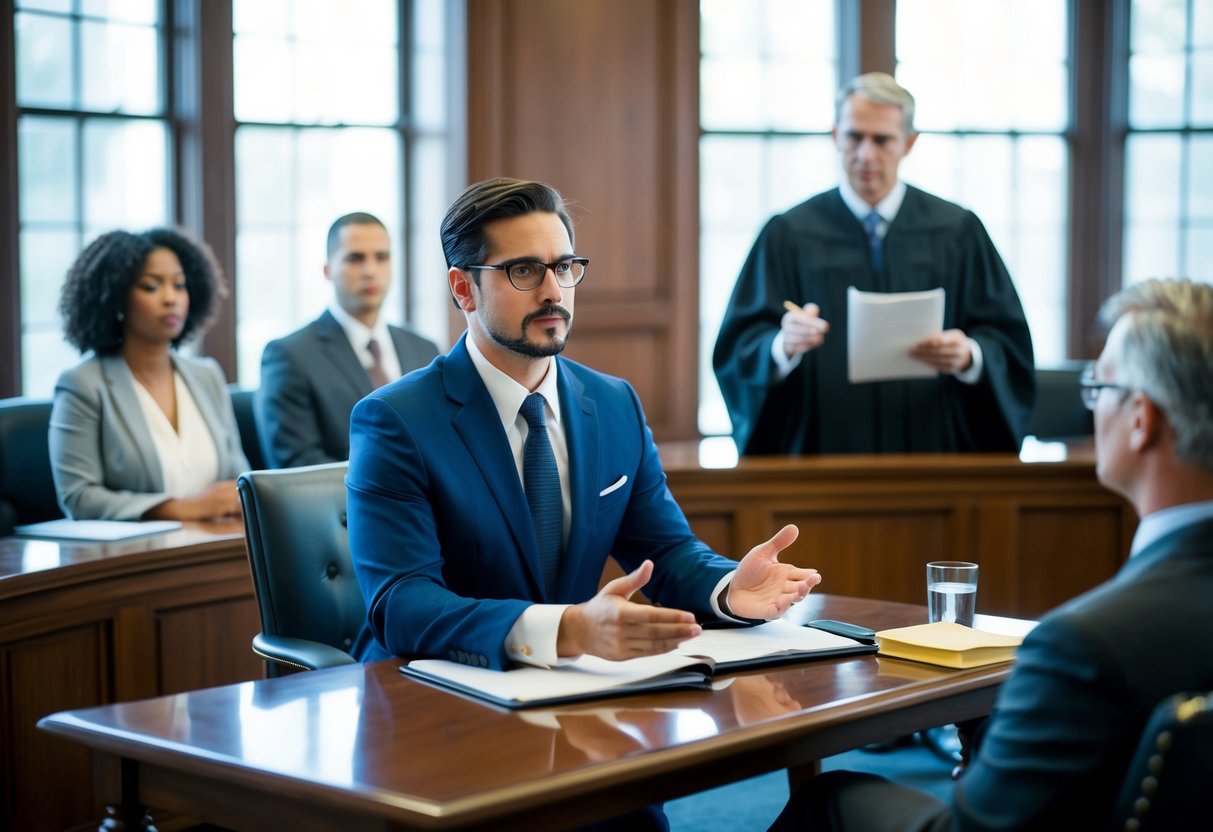Communication skills are crucial for anyone in the legal field, and they hold special significance for criminal lawyers in Marietta. Our ability to effectively convey information, argue cases, and interact with clients and colleagues can determine the outcome of a case. These skills are key in ensuring clients understand their rights and the complexities of their cases.

In Marietta, where the legal landscape is both challenging and unique, solid communication distinguishes successful lawyers from the rest. We must navigate through the courtroom, speaking clearly and persuasively to judges and juries. Strong communication builds trust with our clients and supports building a compelling defense.
Good communication isn’t just about speaking well. It involves active listening, reading between the lines, and writing with clarity. Mastering these skills helps us advocate better for our clients and ensures justice is served.
Fundamentals of Communication in Legal Practice
In criminal law practice, sharp communication skills are our strongest tools. They help us navigate complex legal situations, make persuasive arguments, and build trust with clients and colleagues. Understanding legal jargon and mastering both verbal and non-verbal cues are crucial for success.
Understanding Legal Jargon and Concepts
We often encounter specialized legal jargon. Recognizing and using these terms correctly is essential. Mastery over legal terminology helps us frame arguments precisely. It’s not just about knowing words but also grasping legal concepts.
Breaking down jargon into simple language aids in clear communication with clients. This ensures they understand the intricacies of their case. For effective practice, we must translate complex ideas into understandable terms, strengthening our connection with clients.
The Role of Verbal and Non-verbal Communication
Verbal communication goes beyond words. It includes tone, clarity, and delivery. Strong verbal skills help us present arguments convincingly in court. Our choice of language can influence jury perceptions and client satisfaction.
Non-verbal communication is equally important. Our gestures, eye contact, and posture convey confidence and credibility. We can build trust and rapport through attentive listening and thoughtful responses. By aligning our verbal and non-verbal cues, we present ourselves as competent and trustworthy legal professionals.
Building Blocks of Lawyer-Client Interactions
Building strong lawyer-client interactions in Marietta requires both empathy and clear communication. Key elements include understanding client needs, fostering trust, and effectively addressing misunderstandings.
Fostering Trust Through Empathy and Active Listening
Empathy and active listening are vital in building solid attorney-client relationships. When we show genuine understanding, it helps clients feel valued and heard. Our ability to listen actively allows us to grasp the full context of their cases.
We can ask clarifying questions and repeat back what we’ve heard to ensure accuracy. Building trust hinges on this empathy, reassuring clients that we are truly invested in their case, leading to better client satisfaction and more productive interactions.
Navigating Misunderstandings and Providing Clear Feedback
Misunderstandings can strain our relationship with clients, making clear communication essential. We need to address potential confusion promptly and effectively. Breaking down complex legal jargon into simpler terms can be helpful.
Providing clear feedback involves sharing honest assessments and possible outcomes with clients. By doing so, we maintain transparency and build confidence in our guidance. This approach helps in resolving concerns quickly and strengthens overall client relationships.
Strategic Communication for Criminal Case Success
In criminal law, strategic communication is crucial for achieving successful case outcomes. Skillfully using persuasion and negotiation can impact the direction and result of legal disputes. Understanding courtroom dynamics is also essential for effective advocacy.
The Art of Persuasion and Effective Negotiation
Effective persuasion is a powerful tool in criminal cases. We must present arguments clearly and convincingly to sway opinions. Persuasive communication helps us lead negotiations to favorable resolutions.
Negotiation skills are equally important. In criminal justice, reaching agreements can sometimes be better than extended courtroom battles. A well-negotiated agreement can save time and resources, and it may lead to satisfactory outcomes for all involved. Mastering communication and negotiation allows us to resolve cases efficiently while protecting our clients’ interests.
Delivering Successful Outcomes in Courtroom Proceedings
Courtroom proceedings demand precise and strategic communication. We must convey our points with authority while being attentive to the judge and jury’s reactions. The ability to adapt our messages can influence how the facts are perceived.
Our goal in court is to ensure that our client’s perspective is not only heard but understood. This requires refining our courtroom strategy to fit the unique circumstances of each case. Success in legal disputes often hinges on our skill in navigating these complex environments through communication.
Professional Development and Continuing Success for Criminal Lawyers
In Marietta, criminal lawyers need strong skills to thrive and maintain a positive reputation. Building clear communication and earning referrals are crucial for ongoing success.
Enhancing Legal Communication Skills
Effective communication skills are central to a lawyer’s success. We must tailor our speaking and writing to suit different audiences, whether it’s a client or a judge.
Practical exercises, like mock trials, help us refine our arguments. Attending workshops keeps us updated with the latest techniques. These activities enhance not only our speaking skills but also our listening abilities, ensuring we fully understand our clients’ needs.
Mastering these skills is vital for influencing case outcomes and minimizing the risk of malpractice claims.
Managing Professional Reputation and Building Referrals
Our reputation is a key factor in attracting clients. Maintaining professionalism in and out of the courtroom builds trust with our peers and clients. Good relationships often lead to referrals, helping expand our client base.
We should attend legal events and network with other professionals to increase our visibility. This presence allows us to showcase our expertise, generating more opportunities for referrals.
Adhering to high professional standards reinforces our reputation, paving the way for continued success in the legal field.




